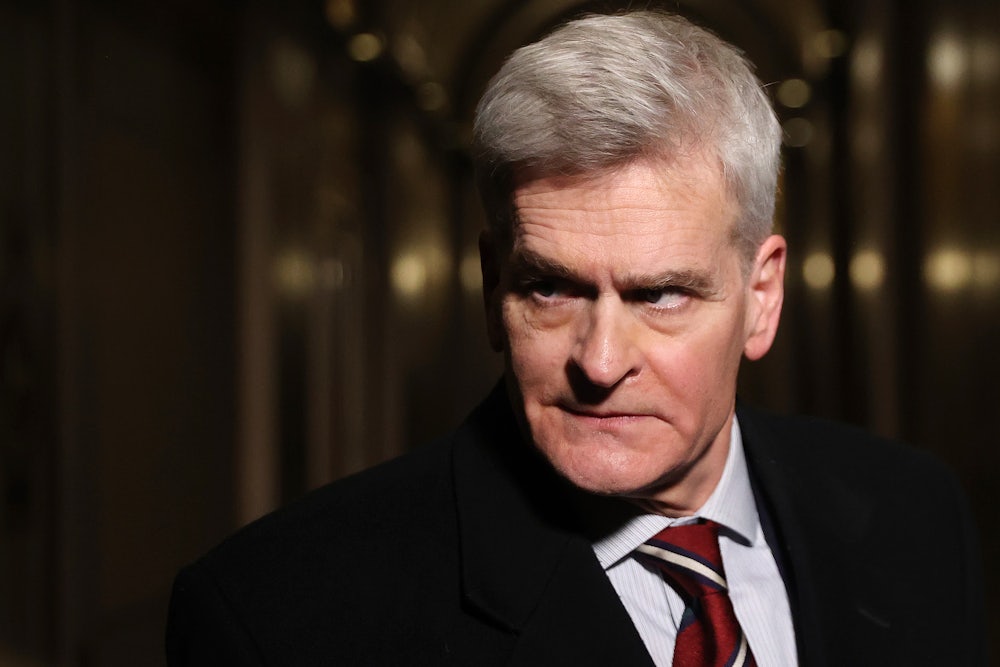If you tuned in to the first day of Donald Trump’s second impeachment trial, you saw the process at its worst and its best. Tuesday’s proceedings were devoted to resolving the question of whether it would be constitutional for the Senate to hold a trial for a former official. The House managers did their duty in presenting a formidable case in favor of the trial’s constitutionality and even its necessity. Trump’s lawyers, on the other hand, made a presentation that veered wildly from embarrassing to dangerous and back again.
At Trump’s first impeachment trial, which ended in his acquittal just over a year ago, many of his attorneys styled their arguments as if they were trying to cut clips for Fox News—heavy on bombast and light on reasoning. This is not a good strategy to persuade the median citizen of Trump’s innocence, let alone actually demonstrate it. But given the role that Fox and other conservative media outlets play in right-wing politics, it made a certain amount of sense as a strategy. Manufacturing 30-second snippets for Sean Hannity’s nightly grievance hour could ultimately protect their client from GOP defections.
This time out, Bruce Castor—the attorney running point in Trump’s defense—brought no discernible strategy to the Senate. The first half of his presentation was a rambling discourse on, among other things, the Senate itself, the senators present, the long-dead senator Everett Dirksen, the Constitution, the purported existence of an ancient Greek senate, the hearsay exception, and more. He then briefly flirted with some of the points included in the trial brief Trump’s legal team filed as part of the president’s defense but did so in a perfunctory fashion. The seemingly off-the-cuff nature of Castor’s remarks led many commentators to wonder if he was making it all up as he went along. As he drew to a close, Castor admitted that the House managers’ case was so “well done” that he had ditched his original plan. From a client’s perspective, this is suboptimal.
Trump’s allies admitted it didn’t go well. “I have no idea what he is doing,” Alan Dershowitz, who staunchly defended Trump during his last impeachment trial, told Newsmax during Castor’s presentation. “The American people are entitled to an argument, but this, after all kinds of very strong presentations on the part of the House managers, it does not appear to me to be effective advocacy.” Nor did senators seem satisfied. “The president’s lawyer just rambled on and on,” Texas Senator John Cornyn, a former federal judge, told reporters after the Senate adjourned. “I’ve seen a lot of lawyers and a lot of arguments, and that was not one of the finest I’ve seen.” He then voted in agreement with it.
As Castor spoke, anonymous Trump aides assured credulous reporters that whatever Castor was doing was all part of some master strategy to “lower the temperature” after the “emotionally charged” presentation by the House managers. But that face-saving measure did not survive the day. By the evening, Politico reported that Trump, who had watched the proceedings live from his exile in Florida, was furious with his lawyers’ performance, especially when compared to the one made by the House managers. The former president is notorious for not paying his bills; in Castor’s case, he would almost be justified.
David Schoen, who took over after Castor finally stopped talking, hewed more closely to the arguments made in the Trump team’s trial brief. If Castor exuded incompetence, Schoen seethed with anger and malice. “Many Americans see this process for exactly what it is: a chance by a group of partisan politicians seeking to eliminate Donald Trump from the American political scene and seeking to disenfranchise 74 million-plus American voters,” he argued. That is not what disenfranchisement means. But a cornerstone of the Trumpian mythos is that any slights against the former president are actually an attack on his supporters.
“This trial will tear this country apart, perhaps like we’ve only ever seen once in history,” Schoen then warned. His allusion to the Civil War mirrors his client’s own dark mindset. During the last impeachment saga, Trump angrily referred to the process as a “coup” and also hinted that it could lead to a “civil war.” The former president has an unusually open thirst for violence in political contexts that’s virtually unprecedented in modern American life. His rhetoric reflects a deeper problem among conservatives: They frequently insinuate that they will murder police officers and elected officials if liberals go “too far,” with what counts as “too far” left open to interpretation. January 6 was the logical conclusion of that worldview.
One might think that the recent attack on Capitol Hill would prompt the president’s lawyers to be more circumspect about their language, especially in front of the senators who lived through it. Schoen plunged ahead anyway. The thrust of his legal and constitutional argument was that the Senate can’t hold an impeachment trial for a former president. He made claims about the Constitution’s plain meaning that belied, well, the Constitution’s plain meaning. He accused Democrats of delaying the trial until Trump left office so Chief Justice John Roberts wouldn’t preside, even though it was Mitch McConnell who kept the Senate out of session until January 19. He complained that there wasn’t enough of an investigation before the House acted, as if lawmakers weren’t firsthand witnesses to the crime in question.
Adopting Schoen’s theory of impeachment would ultimately lead to absurd results. He strenuously argued, for example, that the Constitution doesn’t allow the Senate to disqualify a private citizen from holding future office. Under the Constitution, however, sitting presidents are also automatically removed from office when the Senate votes to convict them. Under the Trump team’s theory, could senators not then vote to disqualify a president at all? After all, at that moment, he would already be a former president and a private citizen—and thus, according to Schoen, beyond the Senate’s jurisdiction to try further.
These issues crop up because Trump’s legal team isn’t trying to make a holistic argument about impeachment and constitutional law. They’re simply trying to suss out the path of least resistance for Republican senators to vote in his favor. That’s what made the presentation by the House managers, led by Maryland Representative Jamie Raskin, particularly effective. They opened with a haunting 13-minute video that combined footage of the rioters attacking Capitol Hill with clips of Trump egging them on. It closed with a tweet from Trump where he described the insurrectionists as “great patriots” and implicitly justified their actions. “Remember this day forever!” he concluded.
“If that is not an impeachable offense, then there is no such thing,” Raskin said after the video concluded. He distilled the Trump team’s position into a simple phrase: the January exception. In Raskin’s view, Castor and Schoen were effectively arguing that a president could commit impeachment offenses during his final weeks in office—perhaps even disrupting the democratic transition of power itself—without the possibility of consequences from Congress. The Constitution’s authors, for all their flaws, were not that foolish. “Trump may not know a lot about the Framers, but they know a lot about him,” Raskin said.
Colorado’s Joe Neguse and Rhode Island’s David Cicciline went on to ably lay out the historical precedents that weigh in favor of the trial’s constitutionality. But it was Raskin’s emotional recounting of January 6 that was ultimately the most powerful moment of the day. He recalled how one of his daughters who was in the Capitol with him that day had asked him if it would be safe, given Trump’s rhetoric. “Of course it would be safe, this is the Capitol,” he replied. Raskin told the senators that he apologized to his daughter after the riot. “Dad, I don’t want to come back to the Capitol,” she replied. “Of all the terrible, brutal things I saw and heard on that day and since, that one hit me the hardest,” Raskin said.
After both sides presented their case, the senators voted on whether the impeachment trial would be constitutional. All 50 Democratic senators and six Republicans concluded that it was; the remaining 44 Republicans voted that it wasn’t. The only senator to change their vote from a similar one last week was Louisiana’s Bill Cassidy, who said he was swayed by the House managers’ case. The Louisiana Republican Party quickly issued a statement that it was “profoundly disappointed” by Cassidy in the Senate’s “kangaroo court.” Even in his putative exile, defiance of the party leader will not be tolerated.








